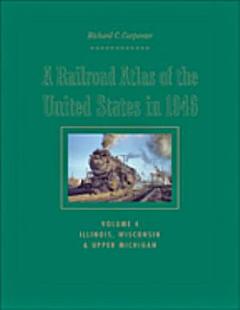With his meticulously crafted, hand-drawn maps of America’s complex and extensive railroad network, Richard C. Carpenter recaptures a time when steam locomotives were still king and passenger trains stopped at nearly every town. Before railroad mergers forced the abandonment of thousands of miles of line and passengers chose to hop behind the wheel of a car rather than buy a train ticket, the United States, at its post–World War II apex, boasted what many considered the finest passenger railroad system in the world.
The fourth volume in this acclaimed series illustrates in stunning detail the rail system in Illinois, Wisconsin, and upper Michigan. Charting not only the exact direction and distance of each rail line, Carpenter also includes with precision the railroad’s operational details: both existing and long-since-demolished signal towers, interlockings, passenger stations, major rail yards, repair shops, crew change points, trackage rights and joint operations, and other rarely mapped, rail-specific sites. The book's unique format allows easy cross-referencing with U.S. Geological Survey maps and DeLorme state road atlases. Also highlighted are rivers, lakes, and state and county boundaries, as well as the mileposts for every line.
These beautifully rendered maps tell the fascinating story of America’s unparalleled railroad network in 1946. Anyone interested in how people and goods moved around the country will find much to learn and appreciate in Richard Carpenter’s one-of-a-kind railroad atlases.

